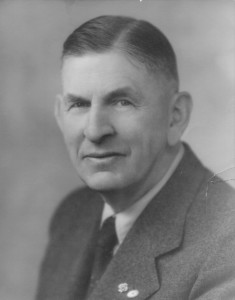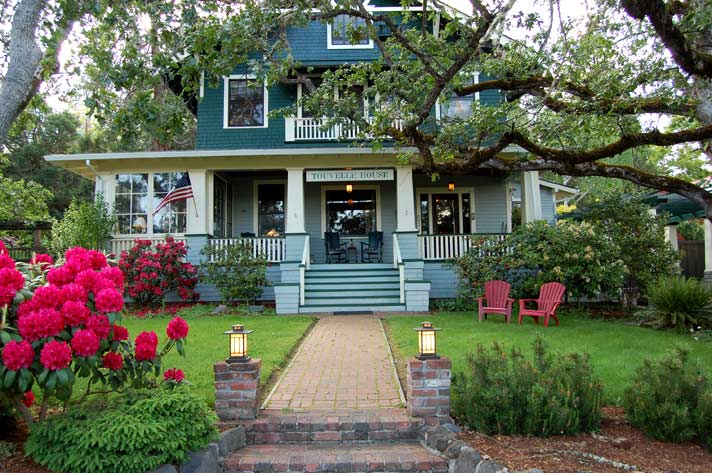Pioneer Profiles – March 2016
The Judge Frank TouVelle House, located at 435 North Oregon Street in Jacksonville, is considered one of the best examples of Craftsman-style homes in the Rogue Valley. A special January 1, 1929 edition of the Medford Mail Tribune featured it in a section titled, “Rogue River Valley has Many Beautiful Ranch Homes.” Today it’s a well-know “bed and breakfast,” and this year, owners Shawn and Jamie Kerr are celebrating the 100th birthday of the house.
 Frank LeBlond TouVelle was part of a later wave of pioneers who came to Southern Oregon during the “Orchard Boom.” In the early 1900s the Rogue Valley gained nationwide fame as a place where almost anyone could plant fruit trees and make a lot of money. This notion was promoted in a lengthy advertising campaign by the Medford Commercial Club, the Chamber of Commerce of its day.
Frank LeBlond TouVelle was part of a later wave of pioneers who came to Southern Oregon during the “Orchard Boom.” In the early 1900s the Rogue Valley gained nationwide fame as a place where almost anyone could plant fruit trees and make a lot of money. This notion was promoted in a lengthy advertising campaign by the Medford Commercial Club, the Chamber of Commerce of its day.
TouVelle was born in Kansas in 1870. He had graduated from the Cincinnati Law School and begun his career at the age of 23 as County Treasurer of Mercer County, Ohio. But like earlier 19th Century pioneers, TouVelle felt the call of the West and the promise of adventure and potential riches. He was one of the “Easterners” who arrived by train in 1905 when the boom was in full swing and buyers were competing for land and orchards. He invested heavily in agricultural land and reaped a small fortune before boom turned to bust. He also demonstrated his sense of humor when he announced his development of “Alfaberry,” a cross between strawberries and alfalfa, and “battlefield watermelons.”
TouVelle became an active Jackson County Democrat, Methodist, and Elk, well-liked throughout the community. When he ran for Judge of Jackson County in 1912, he even gained the support of Republican stalwart J.S. Howard, the self-proclaimed “father of Medford,” who declared TouVelle to be “a splendid gentleman” and “a man of wide experience and broadness of mind.”
TouVelle’s campaign was successful, and he was elected Judge of Jackson County. (The term “judge” is a bit of a misnomer. County judges at the time were not “judges” in the legal sense, but rather served in the capacity of today’s county commissioners.) We can thank TouVelle for helping to start the county’s first public health department during his six year tenure.
However, TouVelle is better known for his inauguration of the “Good Roads Movement” in Jackson County. This national movement to improve America’s roadways had been initiated in the 1880s by the burgeoning numbers of bicycle enthusiasts. By the beginning of the 20th Century, it had been taken over by the automobile lobby and was firmly established when President Woodrow Wilson signed the Federal Aid Road Act of 1916.
TouVelle promoted a “Get Out of the Mud” campaign which resulted in Jackson County voters approving a half million dollar bond issue to improve and grade what is now Highway 99. By 1921, the Jackson County portion of the Pacific Highway offered a paved surface from the county line over the Siskiyous to California and a graded surface to Highway 101 on the coast.
In 1935, Governor Martin appointed TouVelle as State Highway Commissioner. In this capacity, TouVelle oversaw many road improvements as well as more advantageous relocations of highways.
But something was missing from TouVelle’s life, and in 1916 he married Elizabeth Blosser, a native of Chillicothe, Ohio, whom he probably met during his initial career as the Treasurer of Mercer County, Ohio. Their return to Oregon was Elizabeth’s first trip west. However, she soon became heavily involved in valley charitable and social welfare activities, especially the Jackson County Public Health Association, where she was an early president.
As a wedding present, TouVelle purchased the North Oregon Street property in Jacksonville and had the present house constructed based on Elizabeth’s designs. Portions of the previous structure, home to Squire William and Caroline Hoffman (see February 2016 Pioneer Profiles) were incorporated into the architecture and now serve as the library and dining room.
Regrettably, the couple never had children. After Elizabeth’s death in 1931, TouVelle turned their house into a home for needy boys, training and educating at least 12 neglected, under-privileged youth, and sending those who qualified to college. When TouVelle died in 1955, his will established a trust to provide education for “worthy” boys.
Some of TouVelle’s orchard properties remain in the form of TouVelle State Park. In 1917, a year after they were married, TouVelle and Elizabeth purchased 184 acres along the Rogue. Nine years after Elizabeth died, TouVelle donated 50 acres of that land to the State of Oregon, creating a public park where Table Rock Road crosses the river. “It will be a memorial to my wife, Elizabeth,” he said, “and it will be called Elizabeth Park.”
And three of TouVelle’s heirloom Spitzenberg apple trees, thought to be Thomas Jefferson’s favorite, still bear fruit every year on the 1.3 acres of his original 6 acre North Oregon plat.
Although the TouVelles are interred in Portland, their spirits still linger in Jacksonville and the Valley in the form of their home, park, and legacy. Now Shawn and Jamie Kerr are honoring the TouVelles through a year-long Centennial Celebration of the TouVelle’s home. Guests at the TouVelle House can anticipate monthly giveaways and special treats including gift baskets, custom cupcakes, luggage tags, free trolley tours, namesake cocktails and cheese, and more.
Learn more about the TouVelle House at www.touvellehouse.com.
Pioneer Profiles is a project of Historic Jacksonville, Inc. Visit us at www.historicjacksonville.org and follow us on Facebook (historicjville) for upcoming events and more Jacksonville history.
